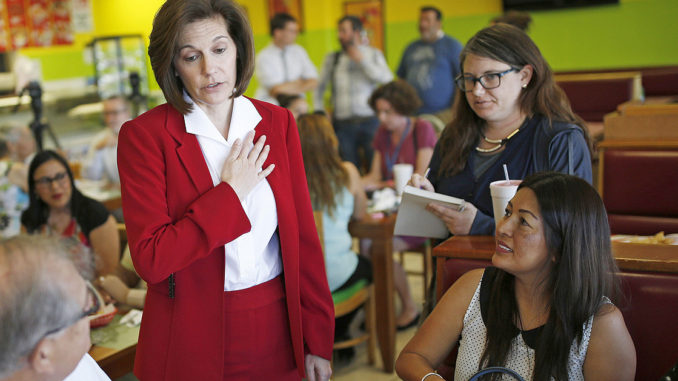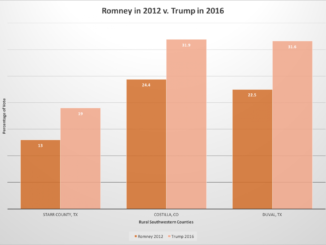
In the lead up to the 2016 U.S. Senate election in Nevada, many were pining for a match-up between Democrat Harry Reid and Republican Governor Brian Sandoval. Reid’s 2015 announcement that he would not seek a sixth term and Sandoval’s decision to pass on the race, dashed these hopes and set off a scramble in both parties to recruit candidates to compete in what has become one of the cycle’s most competitive Senate races. The parties quickly coalesced behind former two-term Democratic Attorney General, Catherine Cortez Masto, and House Republican incumbent, Joe Heck.
Although it will be Heck and Cortez Masto’s names on the ballot, the campaign has become a proxy war among groups on the left and right that have flooded the state with an onslaught of ads of varying veracity since last spring. Open Secrets reports that through the first week of October, more than $45 million dollars has been spent by outside groups in the Nevada Senate election including $21 million in opposition to Cortez Masto and over $17 million attacking Heck. Only the Pennsylvania, New Hampshire, and Ohio Senate races have attracted more outside spending.
For their part, through June, Cortez Masto’s campaign raised $8.7 million and had $3.4 million in cash on hand, while Heck’s campaign has raised $7.4 million and started July with $4.8 million available. Both candidates are cautious and their messaging has been heavy on biography. The granddaughter of Mexican immigrants, Cortez Masto would be the first Latina Senator in U.S. history. Heck is a Brigadier General in the Army Reserves and a Doctor of Osteopathic Medicine; his campaign refers to him as “Dr. Joe Heck.”
Both campaigns have also sought to cast their opponents as minions in the service of others. For Heck this has meant characterizing Cortez Masto as the handpicked protégé of Harry Reid, while the Cortez Masto campaign has painted Heck as a supplicant of the Koch brothers (Freedom Partners Action Fund has been the largest outside spender in the race).
To the degree that policy issues have entered the dialogue, they have largely been used for credit-claiming and to highlight the candidates’ public service records. Staples of Cortez Masto’s talking points are her signature accomplishments as Attorney General: combating human trafficking and securing a settlement from banks that engaged in deceptive mortgage practices. Given that Heck has been a junior member of the majority party during some of the least productive sessions of Congress in the country’s history, his discussion of issues focuses on legislation that he has introduced, often framed to highlight his military and health care background.
In the last quarter century the state that Cortez Masto and Heck hope to represent in the Senate has been transformed from a homogenous, rural space into one of the most diverse and urbanized states in the country. Nevada’s growth and changing demography provides an advantage for the Democrats. However, low levels of political participation, particularly among key Democratic voting blocs (e.g., young voters, Latinos, and Asian Americans) and strong turnout in the state’s reliably Republican rural counties, means that the Nevada electorate is older, more conservative, and less diverse than the state’s voting age population. Moreover, the relatively small share of Nevadans who are college educated reduces the pool of voters who might cross party lines this cycle in light of the tenor of the GOP presidential nominee’s rhetoric.
The contest between Cortez Masto and Heck upends the state’s political geography. Typically, Democrats are better known in Southern Nevada (Las Vegas), which is home to 73 percent of the state’s population and must work to improve their name identification in the north (Reno) and in rural counties, while the opposite holds for Republicans. Although the candidates are both from southern Nevada, Heck’s House district contains most of the Las Vegas suburbs and as a consequence, he started the race better known in the region. In contrast, because state government was established in the northern part of the state, where Cortez Masto went to college and served as Attorney General, early polling indicated that she was better known in Reno and Washoe County (15 percent of the state’s population).
Given these dynamics, the Democratic and Republican formulas for winning statewide elections in Nevada may not hold for this race. Republicans normally win by carrying Washoe and the rural counties and limiting the Democrats’ advantage in the south. The Democratic playbook is to run up nearly insurmountable margins in Southern Nevada to offset the GOP advantage in the rural counties and keep it close in Washoe County and win the nonpartisan vote (20 percent of registered). For the 2016 Senate race, however, Cortez Masto is likely to run stronger in Washoe (than the average Democrat) and will need to minimize Heck’s advantage in his old House district. To offset Heck’s strength in the rural counties, she will need high turnout in the heavily Democratic 1st district, as well as in the highly competitive, Democratic leaning, but Republican held, 4th district.
Cortez Masto is aided in her efforts by the infrastructure that Hillary Clinton’s campaign began developing last summer in preparation for the Nevada caucuses. She also will benefit from one of the best state party organizations in the county (aka the “Reid Machine”), as well as from the door knocking and energy of organized labor including the powerful Culinary Union. Democrats also have a six-point registration advantage over the Republicans (40-34) statewide.
Heck’s voter contacting efforts have largely being outsourced to the Koch brothers-backed PAC Americans for Prosperity. He is getting minimal assistance from the underfunded and activist-dominated Nevada Republican Party and like many swing state Republicans, Heck has tried to step gingerly around the GOP presidential nominee and had largely done so until a recent campaign event. On stage with Mitt Romney, Senator Dean Heller, and 4th district incumbent Cresent Hardy, Heck disavowed his prior support for Trump and even went so far as to call for Trump to step aside. Trump supporters responded by showering Heck with boos—footage that immediately went viral.
In the days after the rally, conservative talk radio was dominated by the voices of angry Trump supporters vowing not to vote for Heck; a Nevada Republican National Committeewoman even rescinded her endorsement. Meanwhile, Heck’s unwillingness to break with Trump until the nominee slid even further in the polls and the Access Hollywood video was released opened Heck to charges of political opportunism.
Regardless of the outcome, the Nevada Senate race reveals much about the pathologies of contemporary American politics: the demise of the norms of political decorum and decency and the consequences this has for our institutions; the corrosive and outsized influence of the political-industrial complex on our elections and governance; and the dividing and sorting of Americans by race, ethnicity, and education. None of this is good and none of it facilitates an environment where our elected officials can even begin to address the challenges and issues facing Nevada and the country. Indeed, the smallness of the Nevada Senate campaign stands in stark contrast to the imprint and legacy of the man who Cortez Masto and Heck are hoping to succeed.
David F. Damore was a nonresident senior fellow in Governance Studies at the Brookings Institution and an associate professor in the Department of Political Science at the University of Nevada, Las Vegas. His primary research interests are the study of campaigns and elections and policy making in the United States at the state and national levels.



